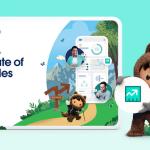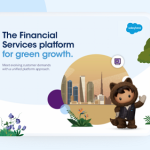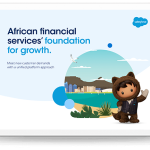Over time, the meaning behind ‘personalisation’ has evolved from “Hey {First Name}” into an email header into something much bigger (and way more valuable).
Nowhere is this more true than in Financial Services. These days, it’s a two-way street: customers expect a unified and consistent experience across a myriad of touchpoints, while banks have an incredible opportunity to deliver more value, more often. Personalisation lies at the heart of this.
In an interview with CNBC Africa, Absa’s Shenin Singh, Managing Executive of Customer Value Management, and Zuko Mdwaba, Area Vice President of Salesforce South Africa, share how personalisation can improve financial inclusion, drive efficiency, and protect against fraud. Absa is one of Africa’s largest financial services groups, offering a range of retail, business, corporate, and investment banking, as well as wealth management and insurance products, primarily in South Africa and Namibia.
Here’s how Absa uses real-world tactics to create tangible and impactful outcomes for its customers, employees, and community. Watch the full interview on CNBC Africa here.
African Financial Services’ Foundation for Growth
Learn how African financial services firms can develop more personalised, attentive, and trusted digital client relationships with their growing customer base.

Four ways Absa uses personalisation for better outcomes
1. Improve the banking experience
Advanced analytics are changing the game for banks and customers alike. Singh gave the example of someone buying their first home. “When engaging first-time homebuyers in a conversation, banks need to respond to the underlying needs, rather than trying to sell a product.”
This is the time to surface multiple moments of value. First-time buyers may have different needs compared to someone buying their second or third home: they’re more likely to need credit to furnish their new home and an insurance plan to protect it.
With this additional knowledge, an advisor can empathise with their customer, and alleviate the pressure of finding multiple providers by offering a more holistic solution. And this drastically improves the customer experience. Building these holistic experiences will become a key differentiator for banks, as 56% of South Africans feel most companies don’t treat them as individuals.
However… There’s a fine line between clever and creepy. To strike the right balance, Singh and her team carry out a lot of customer testing. Absa simulates an increasingly personalised experience, showing customers how the level of personalisation changes depending on how much of their data is used. “To understand this line, the best voice is the voice of our customer,” said Singh. “And that’s what we strive to bring in.”
2. Help with financial inclusion
These personalised, relevant experiences are even more important in the inclusive banking segment. “We see a powerful difference between customers who live 15km away from a branch, and those who live closer,” explained Singh. “Those who live closer hold more products with the bank.”
With personalisation, Absa can provide the right product, at the right time, to the right customer. And this means it can expand financial access beyond the borders of branches, and into digital channels – like the app, or WhatsApp.
3. Protect against fraud
Customers are way more savvy about how their data is used, stored, analysed and protected. In fact, 85% of South Africans are more likely to trust a company with their personal information if its use is clearly explained.
Which is exactly what Absa does. It gives customers practical, tangible examples of how data usage betters their experience. And while there are plenty of use cases within customer experience and marketing, there’s one that goes beyond sales and service: fraud protection. “Because we know you so well, we know when it’s not you logging into the app or onto the website to make a transaction,” explained Singh. “And then we can freeze those transactions.”
Absa makes it clear: data use enables customers, but it protects them too.
4. Drive efficiency and sales productivity
Singh and Mdwaba know that automation done correctly frees up employees to serve customers more effectively. In finance, automating financial planning and accounting functions frees up time for higher-value activities like analysis, strategy and collaboration. In marketing, you can identify your audience, design relevant content and auto-trigger actions based on customer behaviour. And in customer experience, tools like chatbots and self-service free agents help with complex issues.
Absa empowers its customer-facing colleagues with data, which has led to richer conversations and more productive salespeople. By meeting underlying needs rather than focusing on a single product – like speaking with first-time buyers about home loans, credit products, and insurance – Absa has been able to drive three times more sales per interaction. And this is a result of personalised recommendations.
Likewise, since helping colleagues have more personalised conversations with customers, Absa’s front-line use of leads has gone up almost two-fold.
But what inhibits personalisation?
Think of all the times you make a contactless payment, make a withdrawal from an ATM, pay a friend via a banking app, or explore complex products like investments. And, if you need help with any of these services, you may pop into a branch, ring a customer helpline, or send a DM via the website.
To handle these different interactions, there’s a myriad of customer engagement platforms, multiplied across all of a bank’s products and services. That’s a huge amount of terrain to cover in very little time. It’s why complexity can quickly get in the way of your personalisation efforts. “The average company uses 1,000 apps to run business processes and store customer data,” says Mdwaba. “It’s not efficient, effective or affordable.”
“It’s vital to find a way to integrate all these platforms to provide a personalised journey across the entire matrix,” added Singh.
How does Absa use Salesforce to engage customers and create personalised journeys?
Absa and Salesforce work together to empower Absa’s staff – and improve its processes – to deliver personalisation in the right moments, and at scale. Using Salesforce, Absa can deploy personalised analytics that go straight to front-line colleagues so they can engage customers with more personal and productive conversations.
“Salesforce Customer 360 is built to create value and deliver results – it gives teams a shared view of each customer,” explains Mdwaba. By putting relevant customer information (which they’ve approved for use) at the staff’s fingertips, Absa can deliver more value, faster.
Absa uses Marketing Cloud to orchestrate across a web of channels to pick up conversations on social media channels and continue them on a digital platform or with a person for a unified experience that takes place across the channels they’re most comfortable in.
Inspired by Absa’s journey?
Learn how financial services firms across Africa can develop more personalised, attentive, and trusted digital client relationships with their growing customer base.
African Financial Services’ Foundation for Growth
With intelligence, automation, and a unified data culture, businesses are seeing the benefits of Salesforce as a formidable force for change in the financial services world. Download our report to learn more.

























